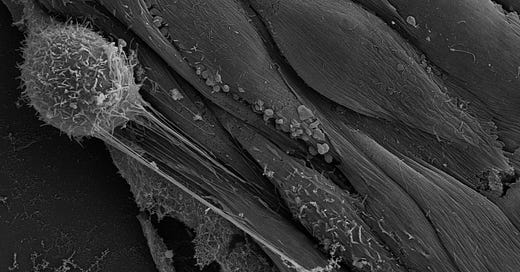Cancer: Metabolic or Genetic?
A different perspective on cancer that explores whether the path towards a cure was already discovered 100 years ago.
Quick disclaimer: if the topic of cancer is extremely triggering and fear-inducing for you, then proceed with caution reading this article.
“The work of people like Harry Rubin has made it clear that functional changes in cells that are becoming cancerous destabilize the chromosomes and cause defects to appear in the genes, rather than the reverse.”
- from the article: “Regeneration and degeneration: Types of inflammation change with aging” by Ray Peat, PhD
Much of the modern western medical model views our DNA (genes) as the architect that carefully plans and orchestrates everything about the body’s structure and function. This view originated in the 1860s and to this day remains the key dogma of much of modern medicine. According to the genetic view of disease, disease is explained as the result of “random mistakes” made by this “architect.” If a cell somehow malfunctions, it’s assumed that it does so because it received a “faulty blueprint” from the “architect.”
This theory views the organism as an authoritarian system run by top-down management. Genes are the boss, and they are set in stone and determined for us. They dictate everything, as cells passively follow their lead. If a disease takes place, it means that the genes “made a random mistake when passing down commands,” and the cells are just following orders.
Maybe, as a society at large, we accept this view because it mirrors the flawed, power-hungry, authoritarian political systems that many of us have lived under. “Big man” at the top makes the rules, and “little guys” at the bottom must follow them with no questions allowed.
Thankfully, nature does not seem to fall to man’s folly, and perhaps if we stopped trying to make sense of the body through a lens biased by our societal conduct, we would notice that the living organism is a true democracy. Everyone has a say. The body at large perceives the environment, and the cells and the genes work together to respond and adapt according to the environment surrounding them. It’s not top-down management. It’s more of a quorum. And disease tends to happen when conditions of the environment get so bad that the body either fails to successfully adapt or the adaptations necessary for short-term survival come with long-term consequences.
What if, genetic expression is largely malleable? What if the expression of “unfavourable” genetic mutations is a response to unfavourable conditions of the environment? What if genes are just “knobs” and “buttons” that the body either turns or presses on or off according to the state of the environment? Because yes, there is proof to this theory. And I will explore all of this and more in this article.



